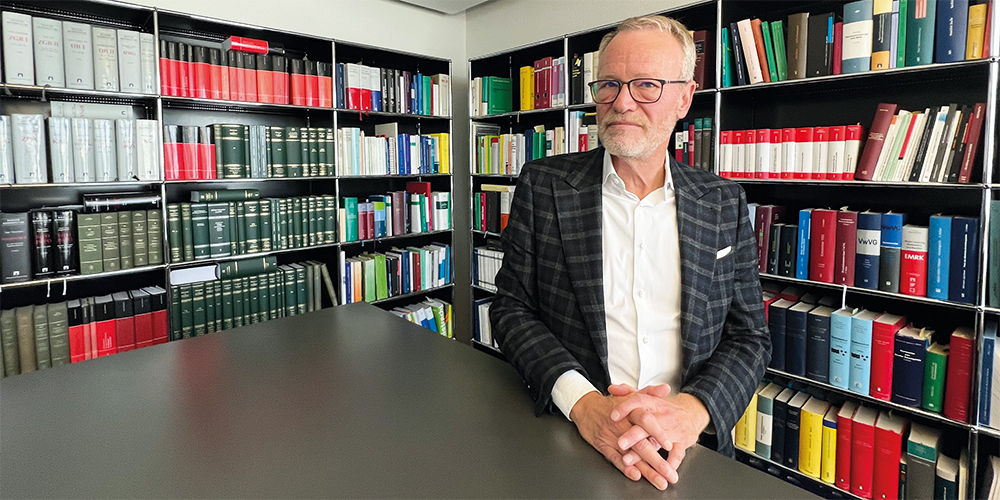"The merger of Immoscout24 and Homegate could be a case for WEKO"

In an interview, Hans Egloff, former member of the National Council and President of the Homeowners Association of Switzerland and the Canton of Zurich, explains the reform of the imputed rental value and the importance of electromobility, as well as the merger of two major players in the real estate industry.
Mr. Egloff, to what extent do you benefit from your law studies for your work as President of the Homeowners’ Association (HEV) of Switzerland and the Canton of Zurich?
It’s definitely helpful. The homeowner has legal problems and questions to solve again and again: From the classic area of ownership to taxes, land register to neighborhood and tenancy law, there is a wide range that is important for our members. We offer our members free legal advice – this is used very actively. But I also benefit from my legal background in political discourse.
The abolition of the imputed rental value is currently being discussed again at the political level. Can you briefly name the disadvantages that this causes for homeowners and who is most affected?
The imputed rental value is taxed on a fictitious income. Homeowners therefore have to pay tax on 60 to 70 percent of the potential market rent as income for their property – notably one that they do not generate in practice. This amount is in addition to regular income. This often means that those affected slide into the higher or even highest progression and thus have to pay a significantly higher amount of tax. Older homeowners in particular are negatively affected by the current practice. They have often paid off their debts so that the debt interest deduction is no longer relevant to them.
How confident are you of the reform going through this time?
The imputed rental value was introduced 100 years ago as a war tax. This was then repeatedly extended for a limited period until it became established as a fixed tax. We have been trying to abolish imputed rental value for 25 years. 10 years ago I was once very confident that we could be successful. The project is now up and running again, but I am not sure that it will succeed.
Where do you see the problems?
On the one hand, homeowners represent a minority in the voting population. On the other hand, people like having homeowners as taxpayers – the state is reluctant to do without them. There is probably no perfect solution in this case.
Energy law initiator Martin Neukom from the Greens said that, according to a survey in the city of Zurich, less than half of the homeowners had considered alternatives to oil and gas when replacing their heating system and that binding rules were therefore needed for the replacement. What do you think of this argument?
In recent years, energy and heating issues have been a topic in every publication of HEV Switzerland and the HEV of the Canton of Zurich. Our members have a high level of information in this regard. Greenhouse gas emissions have fallen by 34 percent over the past 30 years. And this despite the fact that living space has increased by 46 percent over the same period. Our members invest CHF 20 billion in building maintenance every year – CHF 9.5 billion each for energy-related renovations. These figures show that homeowners do take their responsibility seriously.
The City of Zurich Tenants’ Association invalidated other arguments against the planned energy law, i.e. possible evictions, forced house sales or rent increases: the energy law does not force homeowners to comprehensively renovate properties and terminate tenancies. Were the arguments advanced by the HEV and your party, the SVP, misleading?
The Energy Act forces property owners to replace fossil fuel heating systems with ones using renewable energies over time. Let’s take a property from the 1960s with oil heating as a technical example. If this goes out, the owner must have a heat pump installed. With this property, which is already getting on in years, this only makes sense if the building shell is renovated at the same time. If, for example, the flow temperature is no longer reached with old radiators, floor heating must also be installed. On the one hand, this leads to enormous costs. On the other hand, these renovations cannot be carried out with the tenant in the apartment.
«
Inside the building-
area are
we also without
legal
regulations 2050
net zero
»
And what do you say about the political point of view?
In June of this year, the President of the Swiss Tenants’ Association, Carlo Sommaruga, submitted a proposal in Bern in which he literally called for “measures under tenancy law against vacant notices in connection with energy-related renovations”. In my opinion, if the arguments we have put forward were misleading, such an approach would not be necessary.
What contribution do you think homeowners could make to achieve the climate goals?
I believe in personal responsibility, and the figures I mentioned above confirm that this is taken seriously. If one also draws the lowering path of the CO2
If we push further in the building sector, you can see that we can easily achieve the climate goals of the Paris Agreement. In 2050 we will be at net zero. I therefore find a state-defined regulation superfluous in this case.
How important and forward-looking do you personally think electromobility is?
In principle, I am in favor of electromobility. But it brings with it many challenges. On the one hand, we have gaps in the energy supply. We cannot produce enough electricity on our own. That means we have to get nuclear power from France and coal power from Germany. On the other hand, the embodied energy in electromobility is relatively high. No sustainable solution has yet been found for the disposal of the corresponding batteries. For me, there are still a lot of unanswered questions on this topic.
According to a study by the consulting firm EBP, an intensified sale of e-cars fails in terms of electromobility, among other things due to the lack of charging stations in properties. Why do homeowners find it difficult to carry out such an installation?
A private homeowner who needs a charging station for himself will certainly not find it difficult to have it installed. As long as he has the wherewithal to do so. But if you have an apartment building with twelve apartments and an underground car park with ten parking spaces, the question arises as to how many charging stations you should actually install. And who pays for the investment if no tenant has an electric car afterwards? In such a case, the tenant is unlikely to agree to a rent increase. In addition, there is an increasing trend towards car-free housing estates – especially in urban areas. Installing charging stations would make no sense here. Experience has shown that the market regulates many things on its own.
Can you elaborate on the last point?
About 50 years ago you suddenly couldn’t rent an apartment if it didn’t have a bathtub. Or 30 years ago the scenario with apartments without a dishwasher was repeated. I am assuming that future demand will also influence supply when it comes to electromobility. At some point you will no longer be able to rent out an apartment if you cannot offer the tenant a solution tailored to their mobility needs.
How do you assess the real estate bubble that UBS has been predicting for some time and that Zurich in particular is said to be badly affected by?
With regard to interest rate and real estate price developments, I see one constant: the forecasts have always been wrong in recent years. The UBS index has been predicting this bubble for years – it has never burst so far. I personally see a strong real estate market with rising prices. Caution is certainly required when financing home ownership. Especially in the home sector. The portability regulations must be checked individually and comprehensively. Otherwise, a sudden sharp rise in interest rates could pose existential problems for one or the other.
«
an interest
Many countries cannot afford to increase
»
Is there a massive rise in interest rates?
The countries that are relevant for this, ie the EU and the USA, cannot afford an interest rate hike. On the other hand, we see clear signs of rising inflation – this could have an impact. For the real estate market, however, inflation usually means rising prices – because in this situation the need for material assets increases.
You have retired from active politics. Which achievements would you describe as your personal milestones?
My greatest success was definitely the abolition of inheritance and gift taxes for direct descendants in the canton of Zurich. I consider the abolition of the real estate transfer tax, which we brought about with a popular initiative, to be the second major success.
And what milestones have you reached in the real estate industry?
Here I would mention the good contact and exchange between the various real estate organizations. In my early days as President of HEV Switzerland, everyone primarily tilled their own little garden. It was important to me to maintain an exchange and to define common goals. Today we meet four times a year in the Federal Palace and discuss current political dossiers.
Two major players have joined forces with Immoscout24 and Homegate. How do you rate this event?
I’m not sure if this merger is a win for consumers. I assume that we will have to reckon with massive price increases in the future. This case should at most concern the Competition Commission (WEKO).
